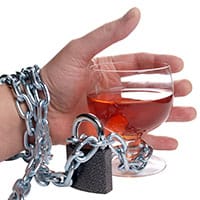New research from a team of Italian and Swiss scientists indicates that people affected by alcohol use disorder (alcoholism and/or alcohol abuse) have substantially increased chances of developing the symptoms of a non-substance-related behavioral addiction. Alcohol use disorder (AUD) is a well-known example of a larger condition called substance use disorder. In contrast, behavioral addiction is one of the terms commonly used to describe an addiction to certain pleasurable activities that don’t feature substance use as a core factor. In a study published in March 2015 in the journal Drug and Alcohol Dependence, researchers from four Italian institutions and one Swiss institution used a small-scale project to estimate the frequency of behavioral addiction in people with alcohol use disorder. These researchers concluded that alcohol use disorder is linked to considerably increased risks for several behavioral addictions, including gambling disorder.
Alcohol Use Disorder
Depending on factors that include the amount of alcohol typically consumed and the frequency of excessive drinking, any given alcohol user can potentially develop symptoms of alcohol dependence (alcoholism) or non-dependent alcohol abuse. People with alcohol dependence have a physically established need to keep drinking that’s based in long-term alterations of normal brain function. People with alcohol abuse don’t have a physically established need to keep drinking, but still establish patterns of alcohol intake that seriously impair their ability to lead functional lives and maintain stable routines. The symptoms of alcohol dependence and alcohol abuse are not entirely separate. In fact, a person with one condition often has at least one symptom of the other. Despite this medically verified fact, doctors in the U.S. once had to choose between alcohol dependence and alcohol abuse when diagnosing their patients. This was true because the widely used guidelines established by the American Psychiatric Association (APA) contained separate and distinct diagnoses for the two conditions. In May 2013, the APA changed this situation by creating the alcohol use disorder diagnosis, which gives doctors the freedom to simultaneously identify symptoms of alcohol dependence and alcohol abuse in any single patient, as well as the freedom to identify isolated cases of dependence and abuse.
Behavioral Addiction
A behavioral addiction triggers many of the damaging changes in brain function and day-to-day conduct normally associated with substance addiction. However, the underlying cause of this form of addiction is recurrent and excessive participation in a non-substance-based activity. The American Psychiatric Association uses the term addictive disorder to describe cases of behavioral addiction. As of 2015, the organization only fully recognizes gambling disorder as an addictive, non-substance-related condition. However, there is a building clinical and research consensus for the existence of other behavioral addictions linked to such activities as Internet use, eating, shopping and having sex or fantasizing about sex.
Overlap in People with AUD
In the study published in Drug and Alcohol Dependence, researchers from Switzerland’s Neuchatel Centre for Psychiatry and Italy’s University of Sacred Heart, University Consortium Humanitas, University of Chieti-Pescara and LUMSA University used information collected from 235 adults to help determine how often behavioral addictions appear in people affected by alcohol use disorder. Ninety-five of the study participants had verified cases of AUD, while the remaining 140 participants did not have AUD and acted as a comparison group. The researchers used a series of screening tools to test the members of both groups for indications of gambling disorder, Internet addiction, sex addiction and shopping addiction, as well as an addiction to exercise. After completing the screenings and analyzing their data, the researchers concluded that fully 28.4 percent of the study participants with alcohol use disorder had potentially diagnosable symptoms of one or more forms of behavioral addiction. In contrast, just 15 percent of the participants unaffected by AUD had symptoms of a behavioral addiction. The researchers specifically linked three non-substance-based addictions—gambling disorder, sex addiction and shopping addiction—to the presence of alcohol addiction and/or alcohol abuse. They also concluded that the combination of alcohol use disorder and a behavioral addiction commonly leads to higher levels of alcohol craving (one of the chief diagnostic factors for alcohol dependence), as well as higher levels of impulsive behavior in affected individuals. When two or more health conditions produce substantially more damage in combination than either condition would cause on its own, doctors and researchers refer to those conditions as comorbid problems. The findings from the current study indicate that alcohol use disorder and behavioral addiction may function as comorbid conditions in a significant number of cases.




